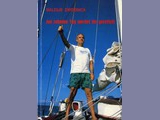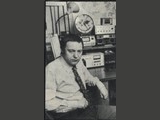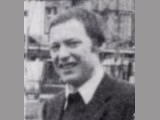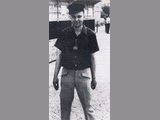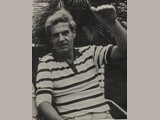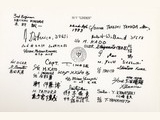Failed attempt - DJ3HG, DJ4EI, DF6FK, DJ6SI - The Spratly Tagedy
April 1983
_thumb.jpg)
![]() The first shot fell short, but the next shot
struck the captain and he threw himself on the floor, although
bleeding badly, as he tried to keep the ship on course. Baldur
was also hit in the arm, and was bleeding, as was Norbert. Gero
was in contact with another station on 20 meters, and advised
him that they were under attack. As Gero left his position, they
noticed that Diethelm was missing. It was not actually known if
he was shot or thrown overboard. Their dinghy had fallen into
the water, and everyone climbed into it, while the boat burned.
The shelling continued, as they drifted farther away from the
island. They had hoped that the message Gero had sent out on 20
meters had been received okay, and they would be rescued by U.S.
Air Force planes in a few days. They believed that the Vietcong
had shelled them, and soon discovered their dinghy had also been
hit, but they were able to plug the hole with cloth. The bad
news was that they had no water, and nothing to eat, and all
were only partially clothed with no shoes. They used a small
basket to catch tiny fish, which they ate, along with a few
mussels from the bottom of the dinghy, but still no water. After
about eight days, Gero tried drinking some sea water during the
night, and he was dead by morning. They buried him at sea. Since
the Spratly Group consists of so many reefs, sandbars and
shallow areas, there is very little shipping nearby, so they had
to wait until they got close to the shipping lanes for any hope
of rescue. Everyone was suffering terribly from thirst - there
was little hunger. The skipper and Norbert were both in bad
condition, and everyone’s hope centered on a vision Baldur had
had a few nights before, when he believed he heard a voice
calling through dense fog: ‘On the tenth day you will be
rescued.” (which later became the title of Baldur’s book) After
several ships passed, indeed on the tenth day (April 19) they
were finally spotted by a Japanese ship, the freighter “Linden”
under Captain Inose. On arriving in Hong Kong, they were taken
to a hospital, where they recovered from their ordeal at sea.
The first shot fell short, but the next shot
struck the captain and he threw himself on the floor, although
bleeding badly, as he tried to keep the ship on course. Baldur
was also hit in the arm, and was bleeding, as was Norbert. Gero
was in contact with another station on 20 meters, and advised
him that they were under attack. As Gero left his position, they
noticed that Diethelm was missing. It was not actually known if
he was shot or thrown overboard. Their dinghy had fallen into
the water, and everyone climbed into it, while the boat burned.
The shelling continued, as they drifted farther away from the
island. They had hoped that the message Gero had sent out on 20
meters had been received okay, and they would be rescued by U.S.
Air Force planes in a few days. They believed that the Vietcong
had shelled them, and soon discovered their dinghy had also been
hit, but they were able to plug the hole with cloth. The bad
news was that they had no water, and nothing to eat, and all
were only partially clothed with no shoes. They used a small
basket to catch tiny fish, which they ate, along with a few
mussels from the bottom of the dinghy, but still no water. After
about eight days, Gero tried drinking some sea water during the
night, and he was dead by morning. They buried him at sea. Since
the Spratly Group consists of so many reefs, sandbars and
shallow areas, there is very little shipping nearby, so they had
to wait until they got close to the shipping lanes for any hope
of rescue. Everyone was suffering terribly from thirst - there
was little hunger. The skipper and Norbert were both in bad
condition, and everyone’s hope centered on a vision Baldur had
had a few nights before, when he believed he heard a voice
calling through dense fog: ‘On the tenth day you will be
rescued.” (which later became the title of Baldur’s book) After
several ships passed, indeed on the tenth day (April 19) they
were finally spotted by a Japanese ship, the freighter “Linden”
under Captain Inose. On arriving in Hong Kong, they were taken
to a hospital, where they recovered from their ordeal at sea.
The GDR exploits the tragedy for Cold War propaganda
Press coverage, particularly in Germany, was heavy (see our
documentation), and some hardliners in the German Democratic
Republic seized the opportunity to launch an attack against
their western counterpart. Baldur Drobnica , officially employed
by the German Federal Republic’s Office of the Interior, was
indeed working for its Bundesnachrichtendienst, the Intelligence
Service's Section IV (Counter Intelligence). His occupational
background - and the fact that GDR intelligence was aware of it
- was to be “leaked” to selected press and political sources in
the GFR, alleging that the Spratly expedition was a spying
conspiracy operation under the disguise of an amateur radio
activity. For that purpose, the GST (Gesellschaft für Sport und
Technik) – the Society for Sports and Technics, (in charge of
amateur radio) was ordered to publish a pamphlet “for restricted
circulation” listing all accusations and suspicions. The records
of this meeting, unfortunately, have not yet been released for
public use. But there is no doubt that Harry Radke, a member of
the ham magazine’s editorial staff, when ordered to author the
brochure, just followed the list of instructions, adding more or
less only ham-related terms. (See our reproduction, in German).
Everything went as planned – even the renowned “Spiegel”
Magazine took the bait: Under the headline "Men from the Rhine"
it wrote in its edition of 9 May 1983: "Is it possible that a
German intelligence officer survives ten days without water and
bread? This miracle happened, purportedly, in the South Chinese
Sea." (Read in full length: ![]() ext. Link ) - After the demise of
the GDR, Harry was heavily blamed and reproached for his
participation in a shoddy propaganda war.
ext. Link ) - After the demise of
the GDR, Harry was heavily blamed and reproached for his
participation in a shoddy propaganda war.
